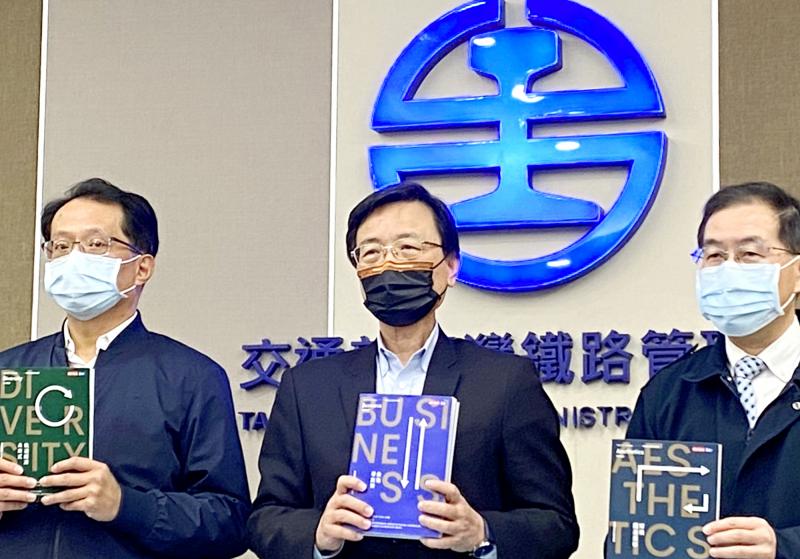Minister of Transportation and Communications Lin Chia-lung (林佳龍) yesterday called on Taiwan Railways Administration (TRA) Director-General Chang Chen-yuan (張政源) to provide an explanation after the TRA was criticized for spending NT$8.84 million (US$310,644) on publications allegedly extolling his personal achievements.
The agency on Wednesday published a set of four Chinese-language books titled Train for Change (一張通往改變的車票), which expand on the agency’s reforms over the past two years.
However, some local media reported that the books might be aimed at touting Chang’s achievements before his retirement next week.

Photo: CNA
Chang in November 2018 took over after former TRA director-general Jason Lu (鹿潔身) resigned over the Puyuma Express train derailment on Oct. 21 that year, in which 18 people were killed and 291 injured.
The agency’s past publications only cost hundreds of thousands of New Taiwan dollars, so it is curious that the latest publication cost millions, Chinese Nationalist Party (KMT) Legislator Hung Mong-kai (洪孟楷) said on Friday, asking whether the books contain advertisements or other propaganda.
The public would not trust the agency if it focuses more on marketing itself than improving railway safety, New Power Party Legislator Chiu Hsien-chih (邱顯智) said.
Publications on the TRA’s developments are conducive to research, reform and tourism related to railways, Lin said yesterday.
However, given that the books in question are for sale, the revenue should go to the TRA, but the agency should explain whether the books’ value is worth the cost, he said.
Separately, Chang denied accusations that the books only tout his performance.
Rather, they document the 16,000 TRA employees’ efforts at improving railway operations, and include interviews with more than 100 staff, he said.
The TRA last year decided to publish the books in the hope of improving communication with the public, he said.
Chang said that the four books revolve around four themes — railway reforms, economics, aesthetics, and the past and future of the nation’s century-old railway culture.
They are not just government propaganda, but are aimed at being interesting reads, he added.
Chang said that the publishing cost was reasonable.
There are 12,000 copies of the books, with each to be sold at NT$500, so the agency expects to receive returns totalling NT$5 million, he said.
Commonwealth Publishing Co beat two other firms to win the bid in August last year, the TRA said.
Of the NT$8.84 million, NT$7.13 million was spent on book planning, design and printing, as well as editing, interviewing, photography and image authorization, it said.
The agency also planned three book launches that cost NT$910,000 in total and other marketing activities that cost NT$800,000, it said.

Eight restaurants in Taiwan yesterday secured a one-star rating from the Michelin Guide Taiwan for the first time, while three one-star restaurants from last year’s edition were promoted to two stars. Forty-three restaurants were awarded one star this year, including 34 in Taipei, five in Taichung and four in Kaohsiung. Hosu (好嶼), Chuan Ya (川雅), Sushi Kajin (鮨嘉仁), aMaze (心宴), La Vie by Thomas Buhner, Yuan Yi (元一) and Frassi in Taipei and Front House (方蒔) in Kaohsiung received a one-star rating for the first time. Hosu is known for innovative Taiwanese dishes, while Chuan Ya serves Sichuan cuisine and aMaze specializes

STATS: Taiwan’s average life expectancy of 80.77 years was lower than that of Japan, Singapore and South Korea, but higher than in China, Malaysia and Indonesia Taiwan’s average life expectancy last year increased to 80.77 years, but was still not back to its pre-COVID-19 pandemic peak of 81.32 years in 2020, the Ministry of the Interior said yesterday. The average life expectancy last year increased the 0.54 years from 2023, the ministry said in a statement. For men and women, the average life expectancy last year was 77.42 years and 84.30 years respectively, up 0.48 years and 0.56 years from the previous year. Taiwan’s average life expectancy peaked at 81.32 years in 2020, as the nation was relatively unaffected by the pandemic that year. The metric

Taiwan High Speed Rail Corp. (THSRC) plans to ease strained capacity during peak hours by introducing new fare rules restricting passengers traveling without reserved seats in 2026, company Chairman Shih Che (史哲) said Wednesday. THSRC needs to tackle its capacity issue because there have been several occasions where passengers holding tickets with reserved seats did not make it onto their train in stations packed with individuals traveling without a reserved seat, Shih told reporters in a joint interview in Taipei. Non-reserved seats allow travelers maximum flexibility, but it has led to issues relating to quality of service and safety concerns, especially during

A magnitude 5.1 earthquake struck Chiayi County at 4:37pm today, the Central Weather Administration (CWA) said. The hypocenter was 36.3km southeast of Chiayi County Hall at a depth of 10.4km, CWA data showed. There were no immediate reports of damage resulting from the quake. The intensity of the quake, which gauges the actual effect of a seismic event, measured 4 in Chiayi County, Tainan and Kaohsiung on Taiwan's seven-tier intensity scale, the data showed. The quake had an intensity of 3 in Chiayi City and Yunlin County, while it was measured as 2 in Pingtung, Taitung, Hualien, Changhua, Nantou and Penghu counties, the data